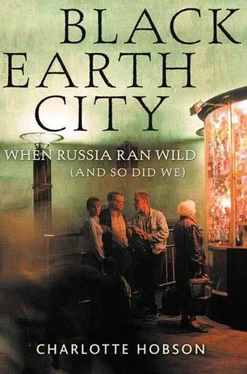Nearby, old ladies hovered, looking mournfully at their ration and itching to weigh it again. But no one dared to speak up. That assistant was a bully. She was capable of taking back the sugar, emptying it on the floor, and demanding, “Happy now?”
Later, economic analysts would say, “People survived that winter because they still had savings accounts stuffed with rubles, as well as the vegetables and so on from their dachas.” That was not how it felt at the time. We went on from the Gastronom to the central market, which was half deserted. Most of the concrete display slabs were bare, and the pigeons fluttering and calling in the dome could be heard above the noise below. In one corner the honey vendors still beckoned, offering to dab the back of your hand with their stiff, yellow nectar. There was sour cream to buy from women wrapped and bandaged against the drafts, and on the opposite side of the hall stringy old men in aprons were selling pairs of pig’s trotters wired together and heaps of offal flecked with sawdust. But the toppling mounds of vegetables had dwindled away to potatoes and moonfaced cabbages, and what customers there were drifted between the counters, asking prices, nodding, and drifting on.
In the street outside, a row of pensioners stood in the cold. They wore their best coats and hats, and at their feet lay their prize possessions: a set of novels by Alexei Tolstoy, crystal glasses, shiny pairs of shoes that had been wrapped in felt since the sixties, a rug from the Caucasus. The goods looked strangely diminished in the open air.
“How much would you like for the shoes?” I asked an old lady.
“Whatever you’ll give me,” she answered faintly. “I’m a teacher, I’m not used to this kind of thing.”
She reminded me of Lisa, my great-aunt who had starved in Moscow at the end of the twenties. In those days, too, the middle classes had stood outside selling everything they owned. There are photographs of pianos and chandeliers in the snow being snapped up by the new Soviet bourgeoisie. Antiques in Russia do not have an easy time. Those same chandeliers were probably back out on the street in 1992.
As March began , torpor fell on the hostel. The days were short and dull and there was no light in the sky. We slept a lot. Jim appeared out of his room one day looking a little dazed, saying, “That makes one hundred and nine hours since I last left the hostel.” Some went traveling to shake off the sadness; one boy left for Mount Elbrus to learn to ski. He stayed so long that he’d qualified as a professional ski instructor by the time he returned.
Others were driven a little crazy. One of the English girls drank so much vodka that finally it poisoned her, and she lay shrieking in the corridor until a doctor arrived and gave her a shot of adrenaline. Peanut, trying to impress, kept attempting to climb up the hostel wall to his new girlfriend’s window and failing; he gave himself a black eye and gashed his leg, and no one was sympathetic. Parties were as likely to end with a group of girls sobbing together as dancing; one was in love with a bastard, another had had an abortion, and none of us were sure what we’d be doing in six months’ time. The year limped toward spring.
I escaped from it all, wrapping my head in a scarf, running across First of May Park, and banging on the iron door of Mitya’s shop. We’d spend the night there, sleeping fitfully on the sun lounger. In the mornings I was exhausted by a procession of busy, unpleasant dreams that were instantly forgotten. Only one stuck in my mind. I was standing in the stairwell of an apartment building in Voronezh. A woman opened the door to me, holding her robe around herself with one hand. In the grimy light she looked fat and forty and tired of life, but she managed an ironic little smile. “Hello,” she said. “You don’t know me.” At first it looked like Sveta, but as I woke, I realized it was me.
The shop smelled stale and claustrophobic. I dressed quietly. Mitya was still asleep as I inched open the iron door and walked out into the shadowy street.
Later that day Mitya came to the hostel to find me. He put his hands on my shoulders and looked at me searchingly.
“I’ve brought you something,” he said at last. “We’re going to stay together, aren’t we?”
I peered inside the bag he’d given me. There lay a set of peach-colored North Korean lingerie (size: medium).
15
International Women’s Day
The cleverness of priests overcomes the cleverness of snakes, but the cleverness of women overcomes the cleverness of priests.
RUSSIAN PROVERB
On International Women’s Day, I bumped into Yakov with his new girlfriend, inspecting the roses for sale in glass cases outside the station. She was called Katya, a dewey-eyed, sweet girl from Voronezh, who accepted Yakov’s particular view of himself unquestioningly. The flower sellers were doing a busy trade; clusters of men stood waiting, counting out rubles in their hands. It was important to buy flowers for the woman in your life on March 8. You’d never hear the end of it otherwise.
The girls in Room 99 had explained it all to me. On International Women’s Day, Soviet women bask in their menfolk’s love and gratitude. In the morning, as it is a holiday, they lounge in bed instead of going out to work. Their husbands, with much cursing and clattering of pans, cook breakfast for the family; by ten o’clock they proudly serve their wives a charred and shriveled egg. Beside the woman’s plate will be a bunch of flowers and a little gift, a bottle of scent perhaps, or a pair of tights, which she will exclaim over until the children, scarlet with fury, insist that their mother make them their proper breakfast.
Later the real celebrations begin. A Soviet woman’s days are usually taken up with dressing the children and taking them to school, arriving at the office on time, nipping out of work at lunchtime to buy something for dinner, and again in the afternoon—if they can sneak away without being reprimanded—to try and find cough medicine for the little one. They’ll leave work at the stroke of six so they can pop into several more shops to check if there is anything good on offer, and into the market where they see some cheap eggs. They’ll pay the electricity bill at the post office and collect their reheeled shoes from the cobbler, since they’re passing; then they’ll dump their shopping at home and pick up a bucket to fill with those cheap eggs from the market. By the time their husbands have arrived home, they will have given the flat a vacuum, dusted, and put two lots of dirty clothes on to soak (always advisable if you’re washing everything by hand). On International Women’s Day, therefore, they go back to bed after breakfast and sleep like squirrels.
Their husbands, meanwhile, meet up with friends and express their feelings for their wives in the simplest and most sincere way they know: by drinking themselves into a stupor with toasts. “To our beloved ladies—where would we be without them?” Late at night they return home and tell their wives they love them. All in all, it’s not a bad day for the women of the former Soviet Union.
Yakov had spotted the flowers he wanted. “Fourteen of the red carnations, please.”
“Fourteen!” exclaimed Katya, thrilled. “But shouldn’t it be one less or more?” Even numbers of flowers are given only at funerals.
“I have to give a few to the girls in Room 99,” he explained. “There,” he said, dividing up the bunch and handing her five flowers with his warmest smile. “ S prazdnikom , congratulations, darling.”
Katya’s face fell and she was quiet as we walked together to the hostel. In Room 99 we found the girls painting their nails dark orange and gossiping.
Читать дальше












